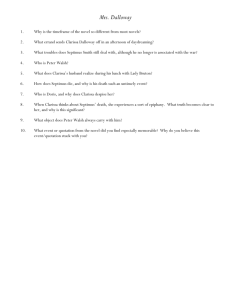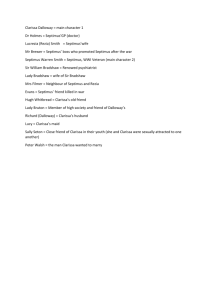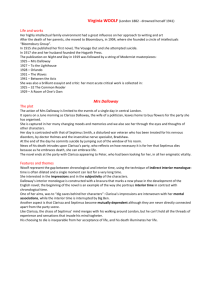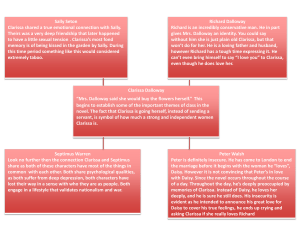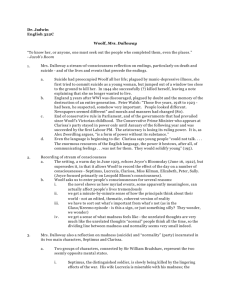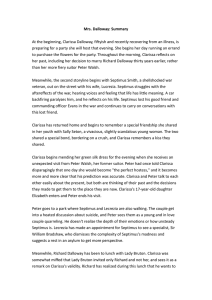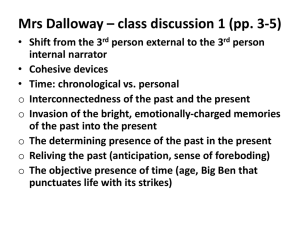dalloway_8_9_10
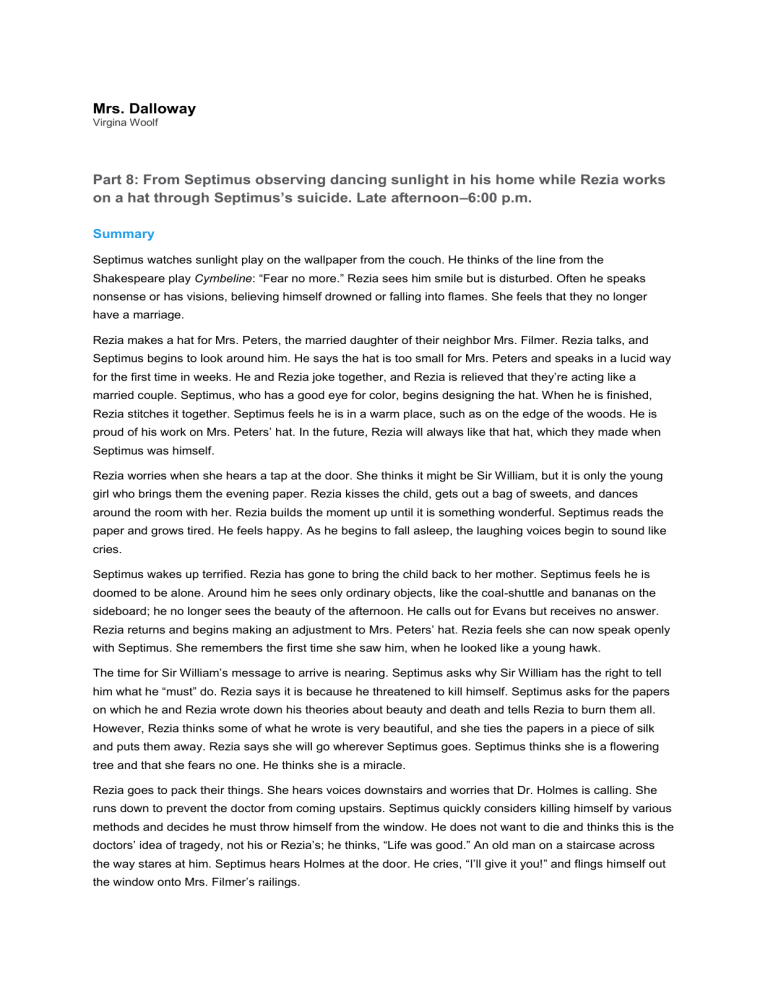
Mrs. Dalloway
Virgina Woolf
Part 8: From Septimus observing dancing sunlight in his home while Rezia works on a hat through Septimus’s suicide. Late afternoon–6:00 p.m.
Summary
Septimus watches sunlight play on the wallpaper from the couch. He thinks of the line from the
Shakespeare play Cymbeline : “Fear no more.” Rezia sees him smile but is disturbed. Often he speaks nonsense or has visions, believing himself drowned or falling into flames. She feels that they no longer have a marriage.
Rezia makes a hat for Mrs. Peters, the married daughter of their neighbor Mrs. Filmer. Rezia talks, and
Septimus begins to look around him. He says the hat is too small for Mrs. Peters and speaks in a lucid way for the first time in weeks. He and Rezia joke together, and Rezia is relieved that they’re acting like a married couple. Septimus, who has a good eye for color, begins designing the hat. When he is finished,
Rezia stitches it together. Septimus feels he is in a warm place, such as on the edge of the woods. He is proud of his work on Mrs. Peters’ hat. In the future, Rezia will always like that hat, which they made when
Septimus was himself.
Rezia worries when she hears a tap at the door. She thinks it might be Sir William, but it is only the young girl who brings them the evening paper. Rezia kisses the child, gets out a bag of sweets, and dances around the room with her. Rezia builds the moment up until it is something wonderful. Septimus reads the paper and grows tired. He feels happy. As he begins to fall asleep, the laughing voices begin to sound like cries.
Septimus wakes up terrified. Rezia has gone to bring the child back to her mother. Septimus feels he is doomed to be alone. Around him he sees only ordinary objects, like the coal-shuttle and bananas on the sideboard; he no longer sees the beauty of the afternoon. He calls out for Evans but receives no answer.
Rezia returns and begins making an adjustment to Mrs. Peters’ hat. Rezia feels she can now speak openly with Septimus. She remembers the first time she saw him, when he looked like a young hawk.
The time for Sir William’s message to arrive is nearing. Septimus asks why Sir William has the right to tell him what he “must” do. Rezia says it is because he threatened to kill himself. Septimus asks for the papers on which he and Rezia wrote down his theories about beauty and death and tells Rezia to burn them all.
However, Rezia thinks some of what he wrote is very beautiful, and she ties the papers in a piece of silk and puts them away. Rezia says she will go wherever Septimus goes. Septimus thinks she is a flowering tree and that she fears no one. He thinks she is a miracle.
Rezia goes to pack their things. She hears voices downstairs and worries that Dr. Holmes is calling. She runs down to prevent the doctor from coming upstairs. Septimus quickly considers killing himself by various methods and decides he must throw himself from the window. He does not want to die and thinks this is the doc tors’ idea of tragedy, not his or Rezia’s; he thinks, “Life was good.” An old man on a staircase across the way stares at him. Septimus hears Holmes at the door. He cries, “I’ll give it you!” and flings himself out the window onto Mrs. Filmer’s railings.
Holmes sees what Septimus has done and calls him a coward. Rezia understands what Septimus has done. Holmes gives her a glass of sweet liquid that makes her sleepy. Holmes does not think Rezia should see Septimus when paramedics carry him away, since his body is so mangled. Before falling asleep, Rezia sees the outline of Holmes’s body against the window. She thinks, “So that was Dr. Holmes.”
Analysis
In this section, Septimus seems to come out of his illness into a kind of remission. He is lucid, sees the world through clear eyes, and does not hear voices. He watches Rezia playing with the child, building up the moment into something wonderful, the way Clarissa does when she walks through the London streets or throws a party. Clarissa and Rezia act as life forces in the novel, and both are compared to trees.
Septimus feels he is on the edge of a forest, because his and Rezia’s souls are now easy together, and they communicate naturally, like any other married couple, over the design of Mrs. Peters’ hat. As Rezia sews, the pair converses intimately, the threads of their thoughts intermingling in a beautiful pattern.
Septimus seems to forget the approach of the doctors. When he wakes up after helping Rezia with the hatmaking and sees he is alone, he experiences the same emotional shock as Clarissa did when she put down her yellow-feathered hat that morning and felt an emptiness at the heart of life. The world is beautiful, but Septimus’s soul has been severely damaged by the war, and the beauty he sees is ephemeral. He tries to preserve this soul from the clutches of the overbearing doctors by asking Rezia to burn the papers on which he drew and wrote his thoughts over the period of his illness. Septimus’s temporary sanity ends with his suicide.
Dr. Holmes’s arrival forces Septimus to choose between committing suicide or surrendering his soul.
Opting for death of the body instead of death of the soul, Septimus flings himself onto the railings beneath his window. Throughout the novel, houses and rooms serve as metaphors for the soul and its yearnings for privacy, and railings mark the border between the interior of the home and the public world of society. By throwing himself onto the railings, Septimus seems to attempt a kind of communication, while at the same time protecting his private soul from Holmes and Sir William. Before his plunge, Septimus sees an old man descending the staircase opposite his window. Unlike the old woman Clarissa observes ascending the staircase or wandering safely through the rooms of her home, the old man is symbolically leaving the privacy of his home. If Septimus must part with the privacy of his soul, he will make his soul public but refrain from sacrificing it. He does not want to die, but since he feels he has no alternative due to the doctors’ threats, he will make the decision and perform the action himself. He demonstrates his refusal to let the doctors take his soul when he announces, “I give it you!” Nobody has taken Septimus’s soul. The first-person pronoun indicates that he has given it himself. Though his death is tragic, he has maintained agency and dignity in choosing his destiny.
Septimus’s suicide reveals the blindness of human nature as embodied by Holmes and Sir William. Before this point, Septimus had given many indications that he contemplated killing himself, the most obvious being when he openly says that it is his intention to do so. Yet Holmes, referring to the suicide, asks how it was possible to predict it would happen and decides that it was an impulsive act for which no one is to blame. These are absurd claims and questions, and they reveal Holmes’s willful blindness to the truth.
Nobody wishes to take responsibility for Septimus’s death or to believe its cause to be anything beyond a spontaneous impulse. Holmes would rather the world sleep quietly and drugged, as he forces Rezia to do,
rather than wake up and ask questions about human cruelty. Acknowledging Septimus’s motivations would threaten the beliefs that are the foundation of the doctors’ lives.
Part 9: From Peter Walsh hearing the sound of an ambulance siren to his opening his knife before entering Clarissa’s party. 6:00 p.m.–early night
Summary
Standing across from the British Museum, Peter Walsh hears the ambulance rush to pick up Septimus’s body. He views the ambulance as one of the triumphs of civilization. The English health system strikes him as humane, and London’s community spirit impresses him. As he walks toward his hotel, he thinks of
Clarissa. They used to explore London together by riding the omnibus. Clarissa had a theory that to know somebody, one had to seek out the people and places that completed that person. She felt that people spread far beyond their own selves and might even survive in this way after death. Clarissa has influenced
Peter more than anybody else he knows.
Peter arrives at his hotel and thinks about Clarissa at Bourton. They used to walk in the woods, argue, and discuss poetry, people, and politics. Clarissa was a radical in those days. At the hotel Peter receives a letter from Clarissa that says it was heavenly to see him that morning. He is upset by the letter, which seems like a “nudge in the ribs” after his vivid memories of Clarissa. The hotel now strikes Peter as frigid and impersonal. He imagines Clarissa regretting her refusal of his marriage proposal and then feeling sorry for him. He pictures her weeping as she wrote him the note.
Peter looks at a snapshot of Daisy with a fox terrier on her knee. She is dark and very pretty. Peter shaves and dresses for dinner. He wonders whether his marriage to Daisy would be good for her, as it would mean giving up her children and being judged by society. He is conflicted about Daisy. He does not like the idea of being faithful to her, but he hates the idea of Daisy being with anyone else. He quickly disregards the age difference between them and takes comfort in knowing she adores him. He decides that if he retires, he will write books.
At dinner, the other hotel guests find him appealing. His self-composure and serious approach to eating his dinner win him their respect. They like the way he orders Bartlett pears firmly. The guests wish to talk with one another, but they feel shy. In the smoking room, Peter and the Morris family make small talk. Peter thinks they like him
. He decides to go to Clarissa’s party to find out what the Conservatives are doing in
India and to hear the gossip.
Peter sits in a wicker chair on the hotel steps. The night is hot but lighter than he is used to, because daylight savings has been introduced since he was last in London. He reads the paper and watches young people pass by on their way to the movies. He thinks the social structure is changing and that experience enriches life. He sets off for Clarissa’s and feels that he is about to have an experience. He looks in people’s lighted windows on his way and enjoys the richness of life. At Clarissa’s house, Peter steels himself, opens the blade of his pocketknife, and enters the party.
Analysis
The ambulance Peter hears is the one carrying Septimus’s body, and Peter’s adoring interpretation of the ambulance siren as a “triumph of civilization” is ironic, because Septimus has sought death to escape the very civilization Peter reveres. In the wailing siren, Peter hears all that is good about English society —its humanity, efficiency, and compassion. However, Septimus found those same things constricting and deadening, not liberating and inspiring. Peter stands across from the British Museum, a structure that suggests England’s might, tradition, and imperial power. Septimus fought to preserve these virtues during the war, and they eventually became hollow and meaningless to him. Peter hears humanity in the ambulance siren, but the in humanity of the English medical system played a part in Septimus’s death.
Peter constantly notices the civilization of England, and the repetition of the word, juxtaposed with
Septimus’s death, calls Peter’s accuracy into question. London is surely no gentler than the countries, such as India, England sets out to “civilize” through colonization. Likewise, the communal spirit Peter observes in
London is also questionable, since the Londoners in the novel, even Peter himself, are incredibly isolated.
Peter reads the world only superficially, seeing what he wants to see and not probing too deeply beneath the surface. Septimus perhaps probes too deeply, and he cannot bear what he finds. Both Septimus and
Peter read the same cricket scores and the same news in the evening paper, a similarity that emphasizes the different ways in which each man interprets the same world.
Though Peter constantly doubts himself and his decisions, at the hotel and the dinner he momentarily reveals the kind of man he could be, or wants to be. Until now, Peter has seemed hysterical, bursting into tears in front of Clarissa and claiming madly to himself that he no longer loves her. At the hotel, however, he seems composed and in control. As he moves about his room, he imagines how Daisy sees him: as a reliable man who shaves, dresses, and takes firm c ontrol of life’s small details. He suspects he cannot actually make her happy, and that she will be better off without him, but he seems to like the feeling of being depended on and looked up to by this younger, foolish girl. At the dinner Peter slides more fully into this version of himself. With dignified detachment he selects wine and eats his dinner, showing more composure than at any other point in the novel. When Peter orders his Bartlett pears, the new Peter seems to crystallize. He knows exactly what he wants, and says so clearly. Gone, for the moment, are the usual hemming and hawing, the incessant justifications and qualifications that usually bloat his thoughts and desires. For this short moment at the table he is comfortable in his own skin.
Clarissa recognizes the conflict between nurturing her need for privacy and fulfilling her desire to emerge and communicate with others, which is why she throws her parties. Peter compares people to fish that swim for ages in the gloomy depths and occasionall y need to come to the surface and frolic in the “windwrinkled waves.” People need to form community, however brief; they need to gossip at parties. The effort to communicate requires endurance, which is why Peter prepares himself and opens his knife before entering the party and why Clarissa purses her lips and creates a composed “diamond” face for the world.
Septimus was tortured in the private world of his own soul after the war and, with his inability to hold himself together, was also at the mercy of the public world. He could no longer summon the endurance necessary to face the world or even exist in it, and even Peter and Clarissa hang on by only a thread
—the tenuousness of which is emphasized by the knife and scissors with which they greet each other earlier in the day. Though Peter often misjudges and criticizes Clarissa, he admires her endurance and strength.
Clarissa may have her failings and weaknesses, but her determination to stitch together her internal and external worlds, however briefly or infrequently, makes her a remarkable woman.
Part 10: From servants making last- minute party preparations through the end of the party and the appearance of Clarissa. Early night –3:00 a.m.
She felt somehow very like him —the young man who had killed himself. She felt glad that he had done it; thrown it away. The clock was striking. The leaden circles dissolved in the air. He made her feel the beauty; made her feel the fun. But she must go back. She must assemble.
Summary
The Dalloway servants rush around and make last-minute party preparations. The prime minister is supposed to arrive, but this does not make any difference to the cook, Mrs. Walker, who is overwhelmed with work. Dinner over, the female guests go upstairs and the men call to the kitchen for the Imperial Tokay, a sweet wine. Elizabeth worries about her dog and tells a servant to check on it.
More people arrive and the men join the women upstairs. Clarissa says, “How delightful to see you!” to everybody, which Peter finds insincere. He wishes he had stayed at home. Clarissa fears her party will be a failure. She is aware of Peter’s critical eye but thinks she would rather be drenched in fire while attempting her party than fade like her meek cousin, Ellie Henderson.
The wind blows a curtain, and Clarissa sees a guest beat it back and go on talking. She thinks her party may be a success after all. Guests continue to arrive, but Clarissa does not enjoy herself. She feels anyone could take her role as hostess but is also somewhat proud of her party’s success. The hired butler, Mr.
Wilkins, announces Lady Rosseter, who turns out to be Sally Seton, now married. Sally heard about the party through a mutual friend and has arrived unexpectedly. Clarissa remembers the moment in her youth when she was thrilled merely to think of being under the same roof with Sally. She thinks Sally has lost her luster, but they laugh and embrace and seem ecstatic to see one another. With her old bravado and egotism, Sally says she has “five enormous boys.”
The prime minister arrives, interrupting Clarissa’s reunion with Sally. He does his rounds and retires to a little room with Lady Bruton. Peter Walsh catches sight of Hugh Whitbread and criticizes him mercilessly in his thoughts. Meanwhile, he watches Clar issa in her “silver-green mermaid’s dress” and feels she still has the power to sum up all of life in a moment, merely by passing by and catching her scarf in some woman’s dress. Peter reminds himself that he is not in love with her anymore.
Clarissa sees the prime minister off and thinks she does not feel passionate about seeing anyone. She prefers the intense hatred inspired by Miss Kilman, since the emotion is heartfelt. She returns to the party and mingles with her guests, all of whom seem to have failed in their lives in some regard. Mrs. Hilbery tells
Clarissa she looks like her mother, and Clarissa is moved. Old Aunt Helena arrives and talks about orchids and Burma. Sally catches Clarissa by the arm, but Clarissa is busy and says she will come back later, meaning that she will talk to her old friends when the others have gone. Everyone's thoughts dip constantly into the past.
Clarissa must speak to the Bradshaws. She dislikes Sir William but tolerates Lady Bradshaw, who tells
Clarissa about Septimus’s suicide. Clarissa goes into the little room where the prime minister sat so she can be alone. She feels angry that the Bradshaws brought death to her party. She ruminates about
Septimus’s death and thinks he has preserved something that is obscured in her own life. She sees his
death as an attempt at communication. She remembers the moment she felt she could die at Bourton in total happiness. She considers the young man’s death her own disgrace.
Clarissa looks out the window and sees the old woman in the house across the way going to bed. She hears the party behind her and thinks of the words from Shakespeare’s play Cymbeline : “Fear no more the heat of the sun.” She identifies with Septimus and feels glad he has thrown his life away. She returns to the party, where Peter and Sally are gossiping about the past and present and wondering where she is. Sally goes to say goodnight to Richard. Peter is filled with terror and ecstasy when Clarissa appears.
Analysis
Septimus’s death makes Clarissa’s party seem even more indulgent than it is. Elizabeth’s obsession with her dog, the men’s enjoyment of their wine, and Clarissa’s gushing welcomes to guests all seem trivial in light of Septimus’s suicide. More troubling is the fact that Clarissa’s party entertains Septimus’s oppressors, the upholders of stifling British society, including Sir William. Most of the guests seem to have failed in some way, and nearly all live in the bubble world of upperclass England. Clarissa’s stuffy Aunt Helena, the botanist who believes in suppressing emotion and any interesting topic of conversation, spent a lifetime weighing flowers down with books to make them flat. This hobby suggests her wish to squash the human soul in order to preserve the social mores of English society; it also demonstrates the danger of applying analytic, scientific study to aesthetic values. The prime minister himself is present, a comical, slightly pathetic figure who struggles to be a figurehead to a public desperate for symbols. The social system is empty and even ridiculous, but Clarissa and her guests uphold it nonetheless.
Clarissa worries that the party will be a failure until she sees a guest beat back a blowing curtain, which serves as a kind of border between the private soul and the public world. Her guest refuses to let the curtain get in the way of his talking, and his beating it back reveals his dedication to communication.
Clarissa imagined her party as a forum for discussion of topics that people would not normally discuss, and people are indeed emerging somewhat from their usual selves. The party seems to be a success. One of
Clarissa’s happiest memories is of the blinds blowing at Bourton when she and her friends were young and honest communication was possible to a greater degree. As the old woman in the window across from
Clarissa’s window suggests, true communication becomes harder as one grows older and more isolated.
Clarissa’s party provides an outlet, however brief, where communication might take place once again.
Here at the party, for the first time, we see Sally Seton as she is in the present, outside of Clarissa’s memory. She swoops in unexpectedly, having heard of the party from a friend as she was passing through town. Clarissa’s first thought is that Sally looks nothing like what she remembered—the luster has left her.
She observes this without judgment or reproach and still asserts that it is wonderful to see her, but even then she adds that Sally is “less lovely.” Clarissa remembers with some disbelief the Sally from Bourton and cannot reconcile those images with the Sally that has appeared in her home. Brazen, wonderful, creative Sally is now the wife of a miner, the mother of five sons, a gardener, and a lady (her married name is Lady Rosseter). Though Clarissa loves flowers, she does not grow them, and Sally’s passion for her garden gives her an earthy and immediate physicality that Clarissa lacks. Though Sally and Clarissa hug and kiss hello, this Sally seems less real than the Sally who has lurked in Clarissa’s imagination all these years.
Sally’s appearance at the party brings the past crashing into the present, and Clarissa, faced now with the real woman from her memories, must confront the present head-on. Clarissa and Sally barely have time to
catch up before Clarissa leaves her with Peter to devote herself to other guests. Clarissa has spent years remembering, even lusting after, Sally, and now that Sally is here, in the flesh, Clarissa cannot face her; as with Peter and the young woman he follows, Clarissa prefers fantasy to reality. In many ways, Clarissa has spent her life stuck in Bourton, with her memories of Sally and her occasional regrets about Peter simmering constantly under the surface of her life. Now, here they are, the both of them —Sally and Peter— and Clarissa barely speaks to them. The feelings she has about them are distant and hollow, not within her heart but outside it. When she sees Peter and Sally talking and laughing about the past, she cannot join them. Only after watching the old woman next door and thinking about Septimus does she gather the courage to find them. To face the present fully she must first come to terms with her own aging and eventual death.
When Clarissa retreats to the small solitary room to reflect on Septimus’s suicide, she experiences a powerful revelation, which is the climax of the novel. The impression of the prime minister’s body is still on the chair in the room, emphasizing that the soul is never completely alone or free from the influence of social pressures. Clarissa feels tha t Septimus’s death is her own disgrace, and she is ashamed that she is an upper-class society wife who has schemed and desired social success. His death is also her disgrace because she compromised her passion and her soul when she married Richard, while Septimus preserved his soul by choosing death. She remembers the line from Shakespeare’s
Othello
, “If it were now to die, ’twere now to be most happy.” She has lived to regret her decisions, just as Othello did. Clarissa sees her life clearly and comes to terms with her own aging and death, which ultimately enables her to endure.
When she returns to the party, we see her from Peter’s perspective, not her own, and the novel ends without any more glimpses into her mind.
